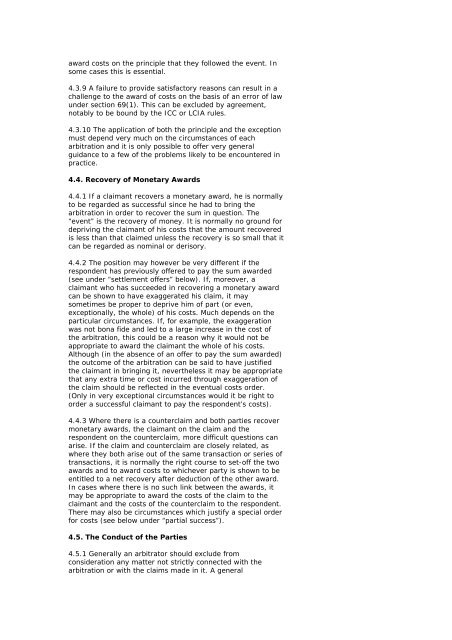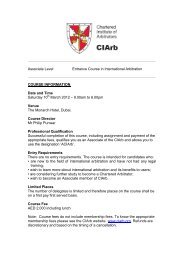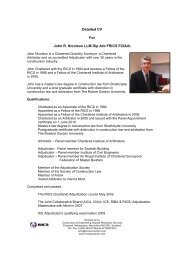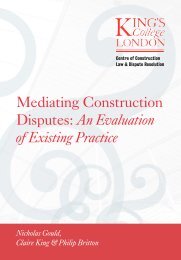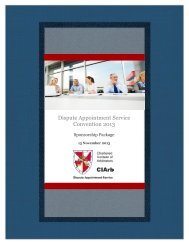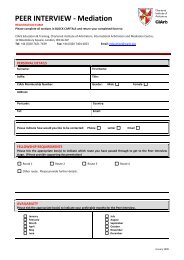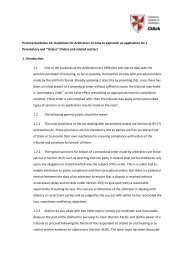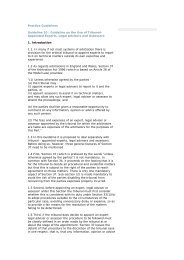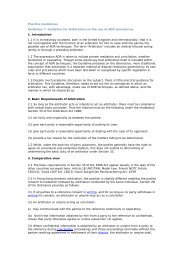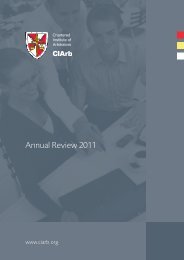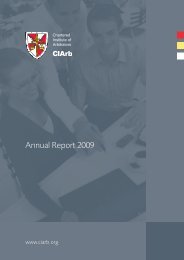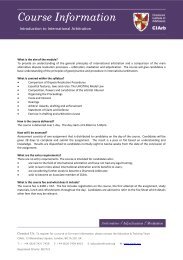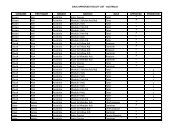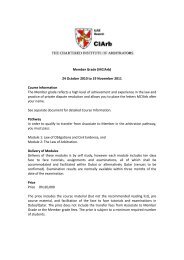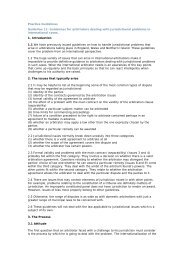Practice Guidelines - CIArb
Practice Guidelines - CIArb
Practice Guidelines - CIArb
You also want an ePaper? Increase the reach of your titles
YUMPU automatically turns print PDFs into web optimized ePapers that Google loves.
award costs on the principle that they followed the event. In<br />
some cases this is essential.<br />
4.3.9 A failure to provide satisfactory reasons can result in a<br />
challenge to the award of costs on the basis of an error of law<br />
under section 69(1). This can be excluded by agreement,<br />
notably to be bound by the ICC or LCIA rules.<br />
4.3.10 The application of both the principle and the exception<br />
must depend very much on the circumstances of each<br />
arbitration and it is only possible to offer very general<br />
guidance to a few of the problems likely to be encountered in<br />
practice.<br />
4.4. Recovery of Monetary Awards<br />
4.4.1 If a claimant recovers a monetary award, he is normally<br />
to be regarded as successful since he had to bring the<br />
arbitration in order to recover the sum in question. The<br />
“event” is the recovery of money. It is normally no ground for<br />
depriving the claimant of his costs that the amount recovered<br />
is less than that claimed unless the recovery is so small that it<br />
can be regarded as nominal or derisory.<br />
4.4.2 The position may however be very different if the<br />
respondent has previously offered to pay the sum awarded<br />
(see under “settlement offers” below). If, moreover, a<br />
claimant who has succeeded in recovering a monetary award<br />
can be shown to have exaggerated his claim, it may<br />
sometimes be proper to deprive him of part (or even,<br />
exceptionally, the whole) of his costs. Much depends on the<br />
particular circumstances. If, for example, the exaggeration<br />
was not bona fide and led to a large increase in the cost of<br />
the arbitration, this could be a reason why it would not be<br />
appropriate to award the claimant the whole of his costs.<br />
Although (in the absence of an offer to pay the sum awarded)<br />
the outcome of the arbitration can be said to have justified<br />
the claimant in bringing it, nevertheless it may be appropriate<br />
that any extra time or cost incurred through exaggeration of<br />
the claim should be reflected in the eventual costs order.<br />
(Only in very exceptional circumstances would it be right to<br />
order a successful claimant to pay the respondent’s costs).<br />
4.4.3 Where there is a counterclaim and both parties recover<br />
monetary awards, the claimant on the claim and the<br />
respondent on the counterclaim, more difficult questions can<br />
arise. If the claim and counterclaim are closely related, as<br />
where they both arise out of the same transaction or series of<br />
transactions, it is normally the right course to set-off the two<br />
awards and to award costs to whichever party is shown to be<br />
entitled to a net recovery after deduction of the other award.<br />
In cases where there is no such link between the awards, it<br />
may be appropriate to award the costs of the claim to the<br />
claimant and the costs of the counterclaim to the respondent.<br />
There may also be circumstances which justify a special order<br />
for costs (see below under “partial success”).<br />
4.5. The Conduct of the Parties<br />
4.5.1 Generally an arbitrator should exclude from<br />
consideration any matter not strictly connected with the<br />
arbitration or with the claims made in it. A general


